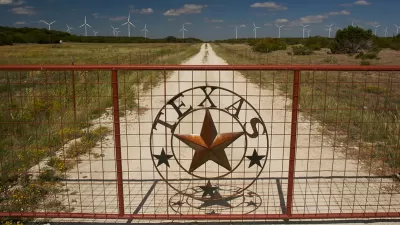Plummeting oil prices means Texans are seeing savings at the gas pump, but they also mean reduced revenue due to Proposition 1, the November 4 ballot measure that diverted energy taxes from the state's rainy day fund to the transportation budget.
Motorists in the United States are enjoying the lowest gas prices in five years, but as noted on Monday, a handful of major oil-producing states, including the nation's largest oil producer, are feeling the economic impact from those same low prices.
"Because [oil] production taxes are based on the cost of oil, falling values lead to falling tax revenues," writes Brandon Formby, transportation reporter for The Dallas Morning News. "That means the long-term transportation funding gap lawmakers were already facing in the 2015 legislative session could be bigger than previously thought."
The voter-approved infusion of cash [from Proposition 1] will be made toward the end of each year, so Texas Department of Transportation (TxDOT) won’t know for several months how much it will get from oil and gas production taxes in 2015. The landslide passage of the proposition in November garnered the agency an almost-immediate $1.6 billion deposit in 2014.
According to Aman Batheja of The Texas Tribune, the Texas Department of Transportation (TxDOT) budget shortfall stands at $5 billion.
But the amount Proposition 1 generates for highways will be a perpetually moving target, ebbing and flowing with oil and gas production and prices. Recent drops in oil prices have raised concerns that future payouts may be lower than originally expected.
Translation: Unless Gov.-elect Greg Abbott and the legislature can find the funds, the savings at the pump could be spent in increased repairs at auto body and service shops due to underfunded road infrastructure as we noted in October about roads in the Midland-Odessa region.
Abbott claims he will find the funds to fill the gap, wrote Batheja on Dec. 9.
I’ve outlined a detailed plan that will ensure that we add $4 billion more per year for building roads in this state without raising taxes, fees or tolls,” Abbott said at a press conference on (Dec. 8).
Legislators weren't so sure. State Rep. Joe Pickett, D-El Paso, who "sits on the Texas House transportation committee, says that shoring up transportation funding — without raising taxes or creating budget holes elsewhere — will be a challenge," writes Formby.
More than a dozen lawmakers have already filed bills that take aim at TxDOT’s shortfall during the legislative session that begins Jan. 13. A bill from Rep. Ruth Jones McClendon, D-San Antonio, calls for [a 10-cent] increase in the state tax on gas consumption. That tax, which is passed on to drivers at the pump, has remained at 20 cents per gallon since 1991. [It is the tenth lowest in U.S. per API, July 2014 (PDF)]
However, Pickett calls any bill that increases taxes "nonstarters." His solution? End what he calls spending "diversions":
That’s the term used for money taken from the state highway fund to cover operating expenses for agencies like the Department of Public Safety and the Department of Motor Vehicles. Officials estimate that more than $618 million that could go to TxDOT instead goes to other agencies each year.
Of course, that would mean diverting funds from the state's general fund to fill expenses previously paid by the highway fund if that bill succeeds. Rep. Jeff Leach's (R-Plano) bill calls for initiating tax diversions of the Proposition 1 type: "send some or all of the sales taxes on car purchases, vehicle rentals, automobile parts and tires straight to the highway fund." [Why not add bicycles sales as well? How about all sales taxes from services located adjacent to state highways?]
Texas legislators are certainly not alone in their reluctance to raise state gas taxes. We may be seeing more 'diversions'—of both kinds, to increase road spending in 2015.
FULL STORY: Falling oil prices could deepen Texas' road funding woes

Study: Maui’s Plan to Convert Vacation Rentals to Long-Term Housing Could Cause Nearly $1 Billion Economic Loss
The plan would reduce visitor accommodation by 25,% resulting in 1,900 jobs lost.

North Texas Transit Leaders Tout Benefits of TOD for Growing Region
At a summit focused on transit-oriented development, policymakers discussed how North Texas’ expanded light rail system can serve as a tool for economic growth.

Why Should We Subsidize Public Transportation?
Many public transit agencies face financial stress due to rising costs, declining fare revenue, and declining subsidies. Transit advocates must provide a strong business case for increasing public transit funding.

Alabama: Trump Terminates Settlements for Black Communities Harmed By Raw Sewage
Trump deemed the landmark civil rights agreement “illegal DEI and environmental justice policy.”

Dear Tesla Driver: “It’s not You, It’s Him.”
Amidst a booming bumper sticker industry, one writer offers solace to those asking, “Does this car make me look fascist?”

A Visual Celebration of Manhattan’s Chinatown Elder Community, Through Food
Lanterns, cafeteria trays, and community connection take center stage in this stunning photo essay.
Urban Design for Planners 1: Software Tools
This six-course series explores essential urban design concepts using open source software and equips planners with the tools they need to participate fully in the urban design process.
Planning for Universal Design
Learn the tools for implementing Universal Design in planning regulations.
City of Santa Clarita
Ascent Environmental
Institute for Housing and Urban Development Studies (IHS)
City of Grandview
Harvard GSD Executive Education
Toledo-Lucas County Plan Commissions
Salt Lake City
NYU Wagner Graduate School of Public Service



























